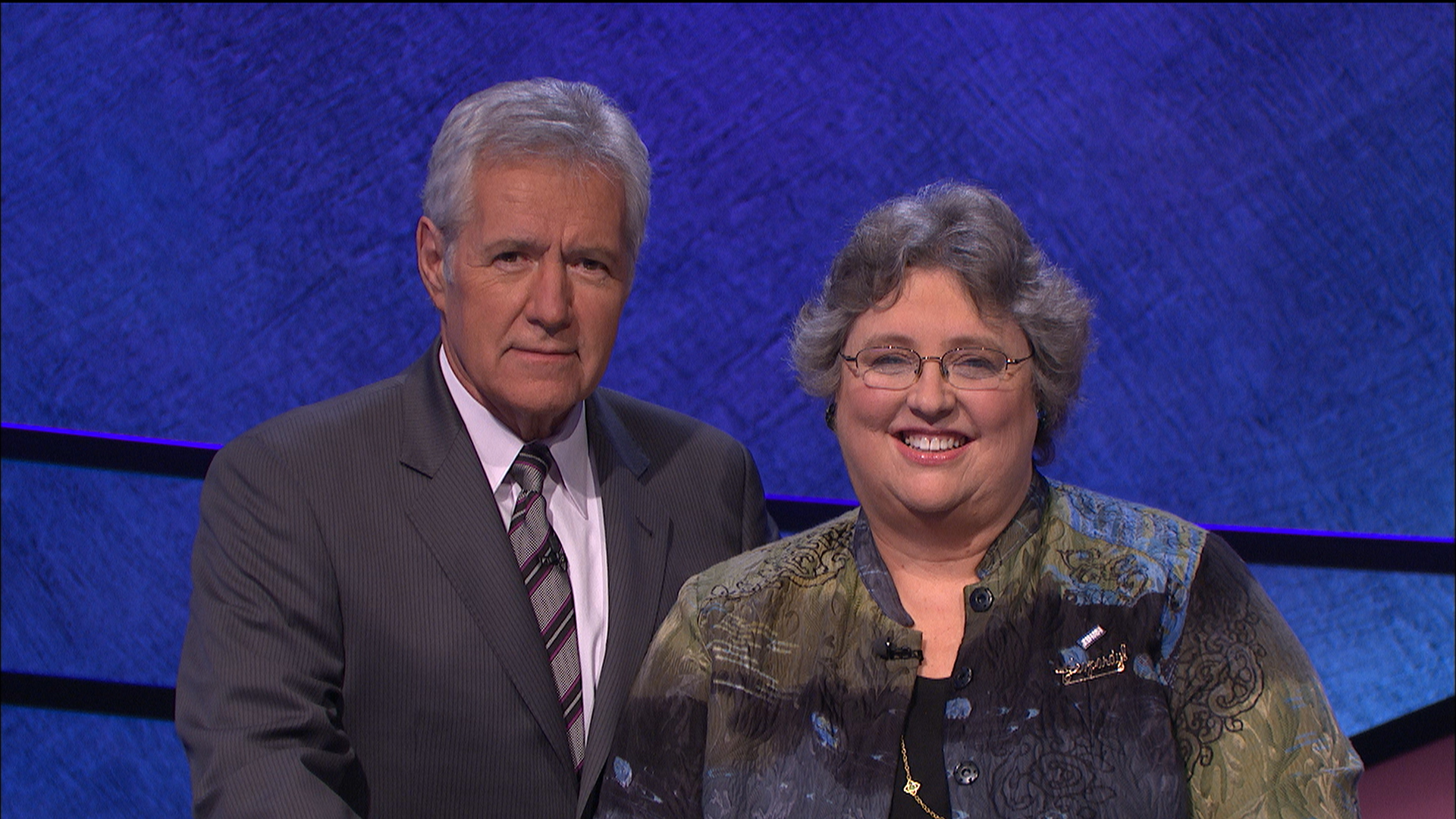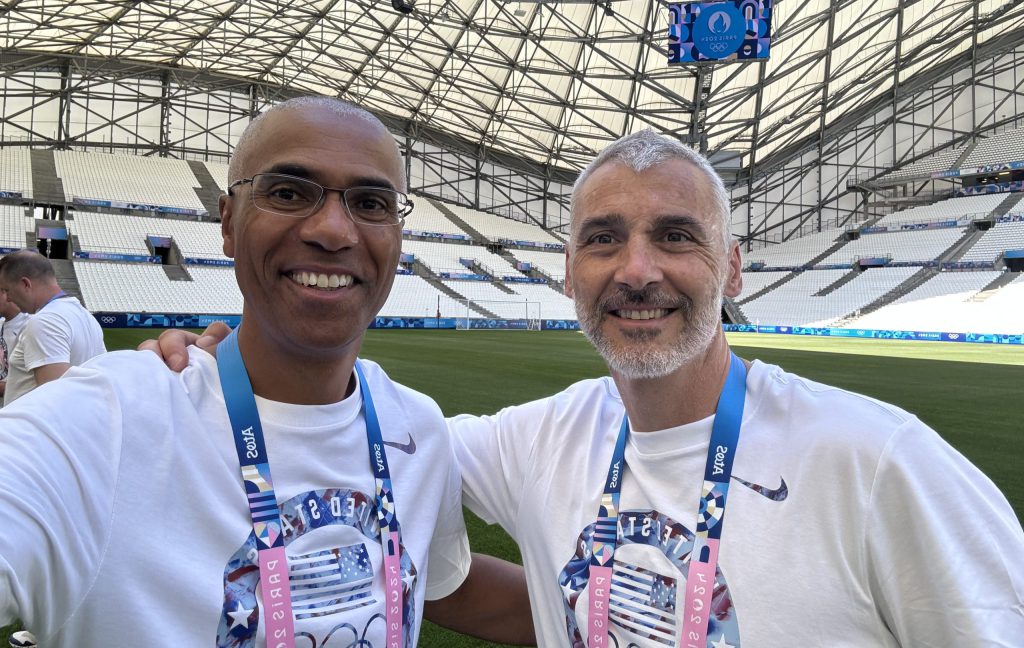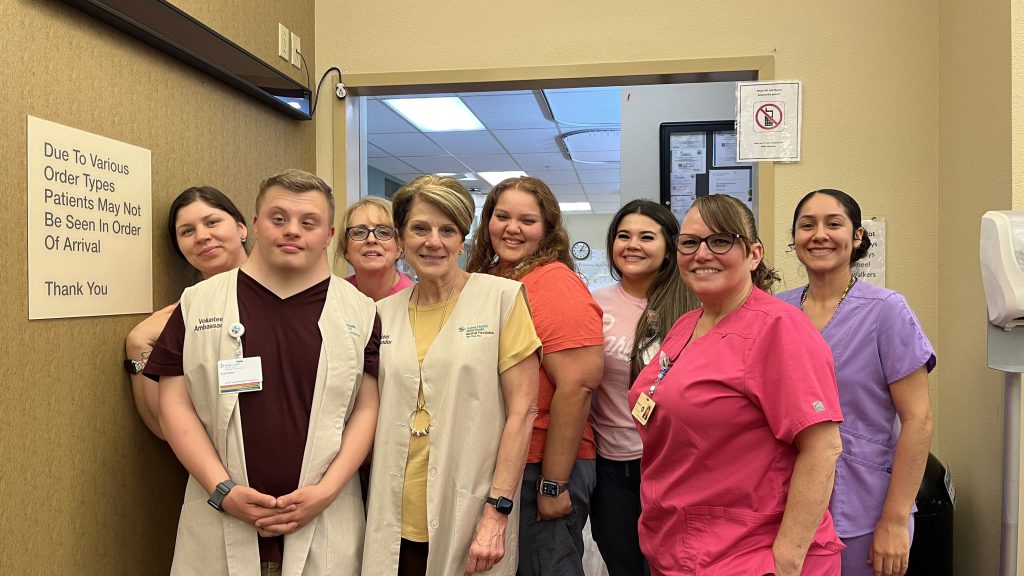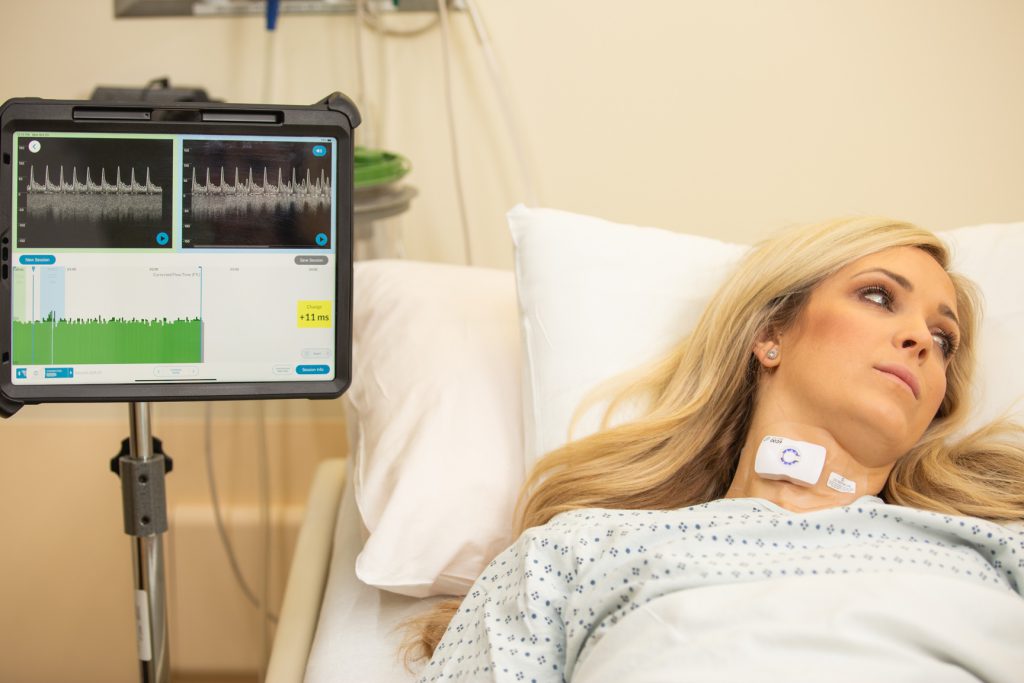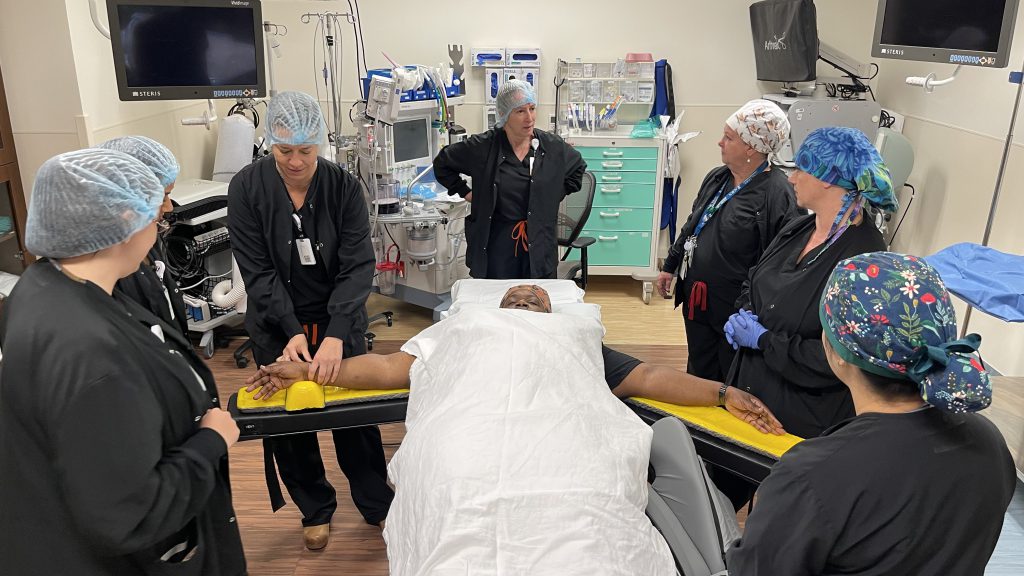Heart patient Leslie Frates, right, appears with “Jeopardy!” host Alex Trebek during the taping of the “Battle of the Decades” tournament in 2014. “I don’t know if I’m the only ‘Jeopardy!’ champion with a TAVR, but I’m one of the only ones,” she says.
By Catlin Valles, Vitals contributor
As a five-time champion of the popular TV quiz show, “Jeopardy!,” Leslie Frates of Hayward, Calif., is one smart cookie. But there’s one thing she didn’t know: She had an underlying serious heart condition that required a life-saving procedure with an innovative device.
“You’re going to be fine.” These are the words 69-year-old Frates remembers hearing in November 2021 from her care team at Sutter’s Alta Bates Summit Medical Center on the eve of her transcatheter aortic valve replacement (or TAVR) procedure. Much to her surprise, Frates had recently been diagnosed with aortic stenosis — a narrowing of the aortic valve opening — which is a common but serious valve disease.
TAVR is a minimally invasive procedure to treat severe aortic stenosis without open heart surgery, restoring a heart valve’s normal function. From the original clinical trials, Sutter network cardiovascular specialists have performed the TAVR procedure since the beginning.
Vacation at altitude leads to scary diagnosis
When Frates first noticed a problem, she was 5,000 feet above sea level in the Sierra Neveda on a vacation with her mother and friends at her parents’ cabin. She remembers “caterwauling like a cat” anytime she tried to lie down to go to sleep. It was so bad that she ended up trying to sleep sitting upright.
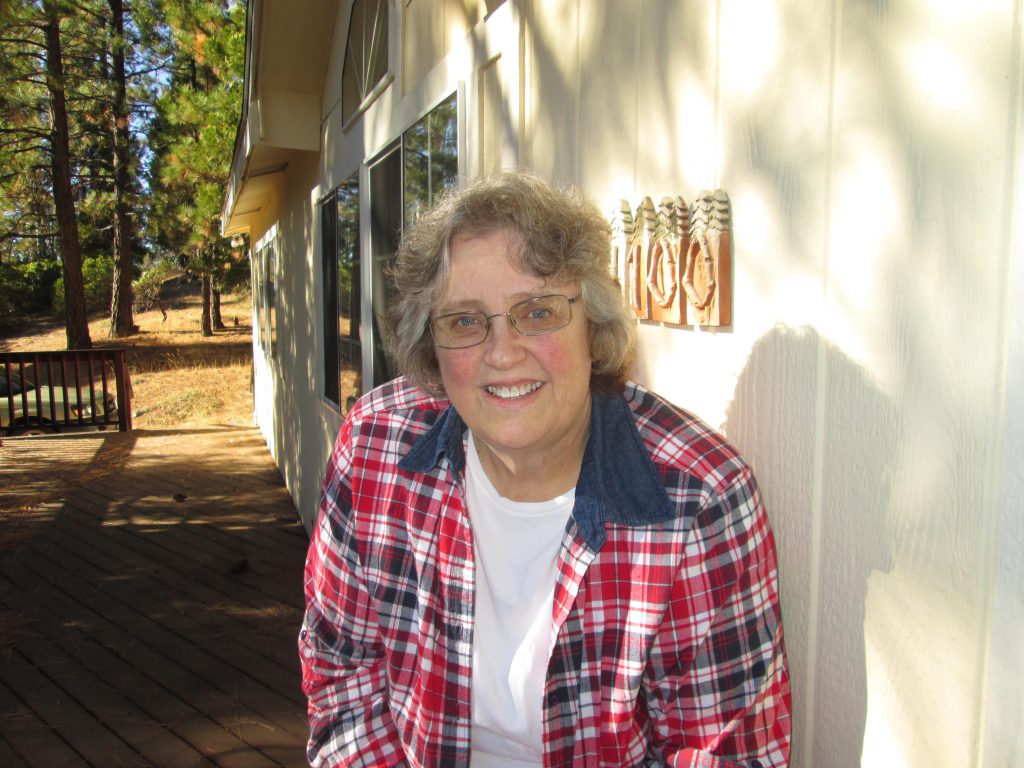
Leslie Frates was enjoying a relaxing vacation with her mother and friends at a Sierra Nevada cabin when she began experiencing breathing issues. At first, she didn’t believe the problem was associated with her heart.
At the time, assuming her breathing trouble was related to bronchitis, Frates went to a local emergency room where they prescribed her a medication that helped her breathe easier. While the doctor suspected heart trouble, Frates had a tough time believing it because heart problems didn’t run in her family.
“Had I ever had heart trouble before? No, absolutely never,” Frates says.
She was admitted to Saint Mary’s Regional Medical Center in Reno, where for five days she had every test imaginable and was retaining so much fluid that they had to prescribe her Lasix to treat edema. Finally, Frates was diagnosed with aortic stenosis and was told to get back to sea level as soon as possible.
The referral that saved her life
When she returned home and called her primary care physician, Dr. Laurence Athos, he immediately told her, “You’re going to see Dr. Kadakia. No ifs, ands or buts.” Dr. Mitul Kadakia, an interventional cardiologist and TAVR specialist at Alta Bates Summit, is among 12 experienced cardiologists closely aligned with Sutter Health to serve patients in the East Bay.
“No more than three weeks after I saw Dr. Kadakia, I had the procedure,” Frates recalls, adding that he was straightforward with her from the start. “He said it was very grave, and he was surprised I was alive. If I hadn’t gone on vacation, I wouldn’t have known.”
She agrees that it was superb luck that a trip to the mountains with friends and family alerted her to a life-threatening underlying heart condition.
The right people in the right place at the right time
“I’m so, so grateful to Dr. Kadakia, and for my primary care physician who referred me to him,” Frates says. Fortunately, after Dr. Kadakia referred her for TAVR evaluation — including a CT scan — Frates’ thoracic surgeon confirmed that she was the “perfect candidate” for the procedure. She was especially relieved to be eligible for a minimally invasive procedure that would not require open-heart surgery.
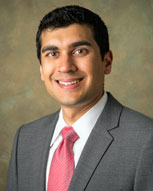
Interventional cardiologist Dr. Mitul Kadakia performed the successful TAVR procedure on Leslie Frates. “I’m so, so grateful to Dr. Kadakia, and for my primary care physician who referred me to him,” she says. “I’m the luckiest woman on the face of the earth.”
Leslie confides that, up until recently, she had held a terrifying record: Dr. Kadakia had never operated on anyone who was still living with a mean gradient as high as hers was. Leslie’s mean gradient — a measure of the pressure difference across the aortic valve — before her surgery was 111. “Normal” is considered less than 10, and patients are likely candidates for surgery when it reaches 40.
“I’m the luckiest woman on the face of the earth,” Frates says. “My mean gradient is now 9. It’s all due to Dr. Kadakia. Because of him, here I am today. I’ve been very lucky to have the right people in the right place at the right time.”
‘You’re going to be fine’
“I was really scared, especially when they couldn’t figure out in Reno what was wrong with me,” she says. “My mother and her girlfriends were an hour and a half away. My brother is in Reno, but because of COVID restrictions, I was all by myself.”
But when it came time for her surgery at Alta Bates Summit, Dr. Kadakia made her feel safe. Between Dr. Kadakia’s partner, Dr. James Lai, plus her thoracic surgeon, Dr. Russell Stanten, and the rest of the team, there were nearly dozen people in the operating room. Leslie says she felt like a real VIP.
“Everything at Alta Bates Summit Medical Center worked like a Swiss watch — the nurses, the people in the lab, the MRIs — everything was right on schedule,” she recalls. “I was in really great care for the several days I had tests, followed by the overnight for the procedure. Everyone watched me like a hawk. The people really know what they’re doing, and it shows. I’m very appreciative. Everybody felt so confident. I remember them saying, ‘You’re going to be fine.’ ”
I’ll take ‘symptom-free’ for $2,000, Alex
Frates, a professed “nerd” in school, said one of her teachers called her “Leslie Almanac.” While she says it wasn’t meant as a compliment, she thought it was cool and wore it as a badge of honor. She then went on to compete on the show “Jeopardy!” 15 times over 34 years and appeared in 2014 during “The Battle of the Decades,” representing the 1980s. Frates is a retired Spanish teacher, having taught for 33 years at both Chabot College and Cal State Hayward/East Bay.
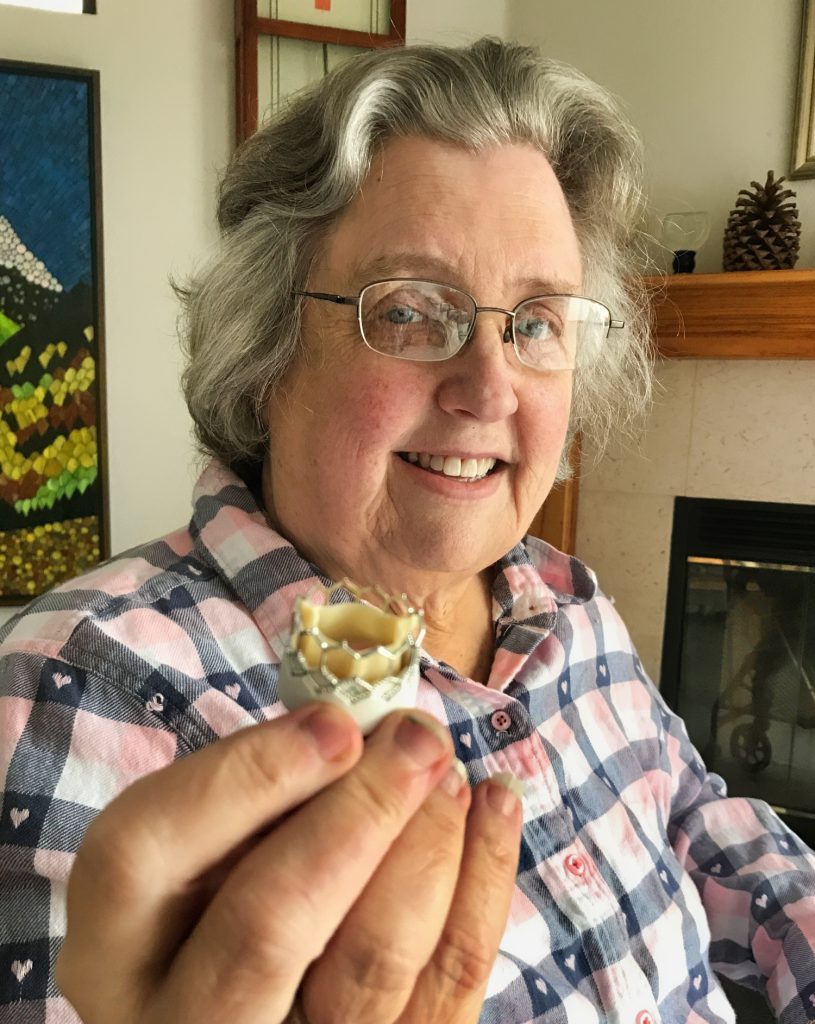
Grateful cardiac patient Leslie Frates holds a model of the heart valve used by Dr. Mitul Kadakia used to save her life.
“I don’t know if I’m the only ‘Jeopardy!’ champion with a TAVR, but I’m one of the only ones. I’m grateful. My life was saved and changed” by the care team at Alta Bates Summit, she says.
Dr. Kadakia called Frates’ success story a “team effort,” and he notes that the TAVR team at Alta Bates Summit is one of the busiest programs in the Bay Area, having just performed their 1,000th TAVR. The program also was recently awarded three stars by the Society of Thoracic Surgeons, which represents the highest rating, only given to a small percentage of hospitals nationally.
In addition to Alta Bates Summit, TAVR procedures are performed at four other Sutter hospitals: Mills-Peninsula Medical Center in Burlingame, California Pacific Medical Center in San Francisco, Sutter Memorial Medical Center in Modesto and Sutter Medical Center, Sacramento, which was one of the first TAVR sites in the nation and recently celebrated its 2,000th TAVR.
These days, Frates’ heart is doing great. She doesn’t even have heart palpitations.
“It just feels so good,” she says, adding that her family is amazed and grateful for her recovery. “I owe it all to the outstanding care I received. As they say, ‘I’m standing on the shoulders of giants.’ ”

